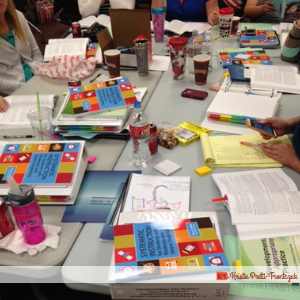 If you were to ask most early childhood professionals the thing they like least about their job, can you guess what they might say? Dealing with behaviors that are challenging would be near the top of the list, but my guess is that paperwork is something they also dread.
If you were to ask most early childhood professionals the thing they like least about their job, can you guess what they might say? Dealing with behaviors that are challenging would be near the top of the list, but my guess is that paperwork is something they also dread.
Sure…it’s expected if you work in an office or as a clerk…but who ever told you that as a speech pathologist, a teacher, or a child-find specialist your days would be consumed with writing reports!?!?!
From quarterly assessment summaries, to individualized education program (IEPs), to Kindergarten transitions, report writing can consume a considerable amount of time.
And to what end? Does anyone even read your reports?
How you answer these questions might shed light on why you aren’t a fan of paperwork.
Here are a few more reasons you may not be a fan:
- Paperwork takes you away from time interacting with children and families. You know…the reason you entered the profession in the first place
- People seem more concerned about compliance and filling the form out the “right way” versus how the report will be used to make a difference
- What is contained in the report often focuses on problems, what isn’t working, and what a child is not able to do
“Over 90% of people go home at the end of the day feeling unfulfilled by their work.” -Simon Sinek
So how can we make paperwork less of a burden and a more meaningful aspect of our work?
Our argument is we need to reframe not only our mindset, but how we actually write reports.
We need to shift from using negative language that focuses on the “root of the problem”…to using affirmative language that focuses on the “root of success”.
For example, instead of writing that a child’s development is atypical or behind what is expected for their age, use statements such as:
- This is where the child will likely thrive based on their current competencies
- These are the existing standards and here is what we will need to support beyond those standards to achieve desired outcomes
- The child needs defined support in the following areas…
- Based on what we know today, we’d like to support the child in doing…by…
- Milestones based on today’s knowledge, show progress and possibility in…
See the difference? Feel the difference?
In making the shift to using affirmative vocabulary…you just might find more pleasure in generating reports. You might also find that using affirmative vocabulary helps reframe your entire approach to supporting children and their families.
Want more ideas on how to incorporate affirmative vocabulary into the reports you are writing?
Guest Blogger: Jennifer Lopez
 Jennifer is a coach, consultant, and corporate leader. She is a community advocate for children, passionate about creating safe spaces for children to learn and play. As trustee of the Children’s Museum of Cleveland, she develops strategies to engage the community and generate enthusiasm for its mission.
Jennifer is a coach, consultant, and corporate leader. She is a community advocate for children, passionate about creating safe spaces for children to learn and play. As trustee of the Children’s Museum of Cleveland, she develops strategies to engage the community and generate enthusiasm for its mission.
Jennifer holds a Master of Science in Positive Organizational Development and Change from Case Western Reserve University, birthplace of Appreciative Inquiry and a leader in the fields of Resonant Leadership and Emotional Intelligence.
She is the wife of a jazz musician, mother of five glorious children, and a devotee of compassionate leadership as a means of bringing out the best in people to create thriving teams and organizations.
Connect with Jennifer on Instagram and visit her website to learn more about her work.